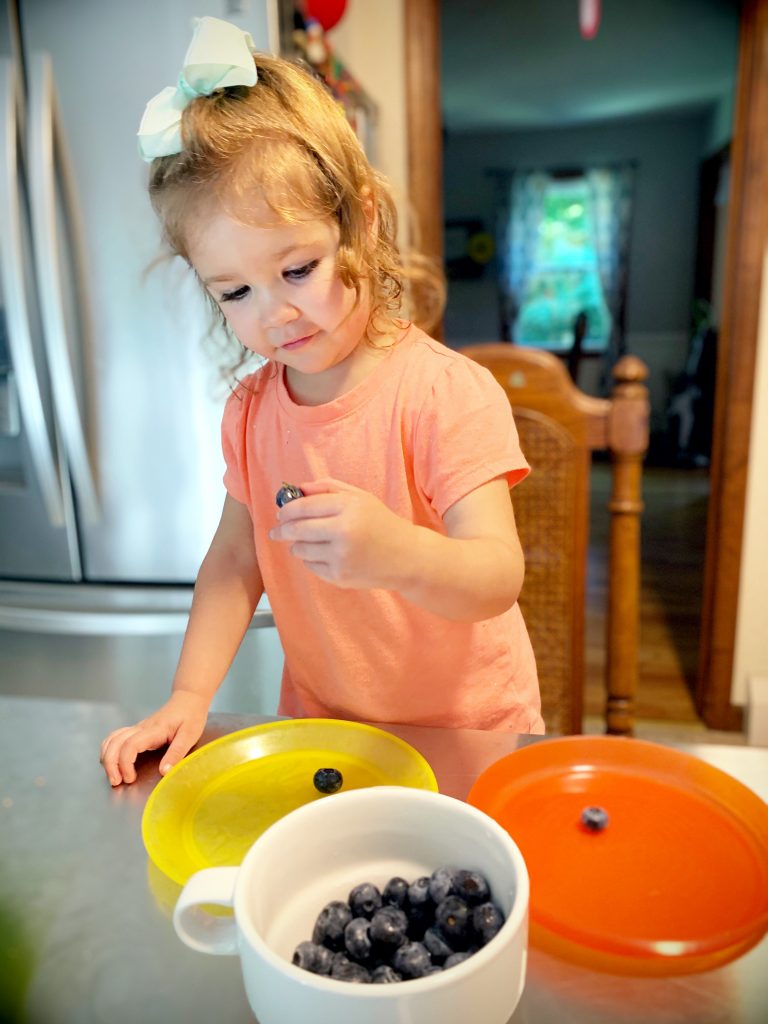The most important thing I’ve learned in my work as a Birth to Three provider is that every experience is a learning opportunity, especially when it comes to everyday routines.
Research states that children learn best in their natural environment with the people who are around them the most, which is why it’s generally the parents who drive my sessions. However, something I hear a lot is something to the effect of, “Well, the kids are eating around that time, so it’s probably not the best time to do speech.” Since I wasn’t planning on just “doing speech,” mealtime is the absolute perfect time to help the parent or caregiver identify all of the learning opportunities that happen during that daily routine, which is what I love best about my job.
I love providing education on how many learning opportunities (including those that involve communication) go into something as mundane as preparing and eating a meal.
Although it’s difficult as a parent to let our children (especially toddler/preschool age children) “help” with tasks, it is essential. When we allow our children to help us, these tasks often end up lasting a heck of a lot longer, right? And it’s just “one more thing” we have to do during our day.
We are so busy as parents of young children doing “all the things” that we often don’t take the time to stop and take advantage of the little sponges that our very young children are.
Even though I’m a speech-language pathologist, I tend to look very holistically at the entire child and their development, not just at their difficulties with communication. Communication doesn’t exist in a vacuum but is only one facet of a fully-developing child.
So tonight, during the chaos of dishes, laundry, getting up from naps, and trying to get at least some paperwork done for work, I also had to prepare dinner. My twins love to “help,” and it drives me nuts because they just dump things and eat as they go, which makes my attempt at a sit-down dinner even more difficult. Plus, there’s two of them, which any twin mama knows isn’t just double the work, but it’s exponentially more work (“twin world” and all).
Well, tonight, just one of them saw me in the kitchen. She pulled a dining room chair over, climbed up to the island, asked to put the blueberries on the plates, and completed the task with minimal help – except that she gave herself about three times as many as she gave her sister!
In that exchange, which only took a couple of minutes, my 3-year-old made a plan and executed it. She worked out how to get the heavy chair over the threshold by moving it side to side, pushed it to the island, and climbed up on it (all gross motor skills). Then, she looked at me and asked not only if she could help, but also told me what she wanted to do (non-verbal and verbal communication skills, asking a question, waiting for an answer, and labeling what she wanted to help with).
Next, she picked up blueberries between her thumb and forefinger, called a pincer grasp (an important fine motor skill). She was able to count the blueberries as she put them on different colored plates, not only labeling the colors on her own but also putting blueberries on the plate I asked her to (pre-academic skills and following spoken directions).
She then proceeded to eat the blueberries on her plate using her fork (fine motor skills and adaptive/feeding skills). During this time, I asked her what her favorite part of the day was (“building tracks with sister”), trying to capitalize on the rare moment I got with her one-on-one. Then came the screech from the other room as “sister” needed help with the aforementioned tracks, and the rare moment with my youngest child vanished.
Amid the crazy-town that is my house at any given moment throughout the day, my children are growing up. It’s so easy for me to miss or gloss over these learning opportunities, these tiny snippets of time throughout the day. But it’s these tiny snippets of time where I have the responsibility to teach my children and to capitalize on a moment I have their undivided attention. A moment where they have my full attention.
It’s these moments throughout my day that many parents I work with might not notice. It’s my job to help them notice that they aren’t just “doing speech,” they are creating a language-rich, learning opportunity-filled day where a few tiny exchanges can make huge impacts in their child’s development.
I’m coaching parents to tune in to the times during their day when they can, and not judging them when they can’t. When my clients understand just how many opportunities exist and realize that they don’t have to do much extra to make the moment special, I’ve done my job. Because parents are their child’s first and best teachers, and I think that sometimes that’s easy for all of us to forget.
Maybe that’s something I need to pay a little more attention to when I’m bogged down in my day too, because sometimes I do feel like I’m failing. Maybe I need to bring my work home sometimes, so I remember how important it is to seize all of these learning opportunities I preach about all day at work. I’m her communication partner. I’m her teacher. And most importantly, I’m her mother.
























